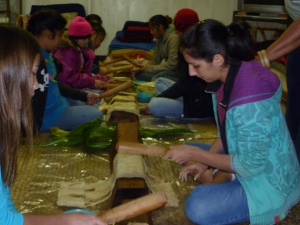Did you know that Hawaiian language was once considered a good example for a universal and global language? The alphabet is short and pronunciation is phonetic. Well, it may be true that phonetic spelling is simple to speak at face value, but Hawaiian language is far from that simple.
Hawaiian language has layers of depth, metaphoric expression, dualism, and symbolism that intertwine with scientifically-based manaʻo for living. This knowledge takes a lifetime to maopopo (recognize and understand). I think that generational transference is the best way for this kind of knowledge to be absorbed in language development. As with any language, idiosyncratic phrases are expressed colloquially and embedded in the language as cultural nuances. At any rate, immersion in cultural understandings is a must. For me, ongoing immersion implies a contextual base in which the language is used. For instance, making kapa is ideally suited for language development, and practical use. Some other activities with specific vocabulary can be found linked with culturally consistent practices such as fishing, farming, weaving, woodworking, and canoe paddling… these provide contexts for developing language and cultural understanding. Language and craft, and a healthy understanding of values are foundations of cultural growth and perpetuation…
Traditional stories, chants, riddles, and proverbs are relevant today for contemplation of Hawaiian manaʻo and can be used to build up our culture. This kind of culture-based education is already being done here and there. To this I say, E mahalo nō! E ola mau i ka Lāhui o Hawaiʻi! Thank you and long live the Hawaiian Nation!



